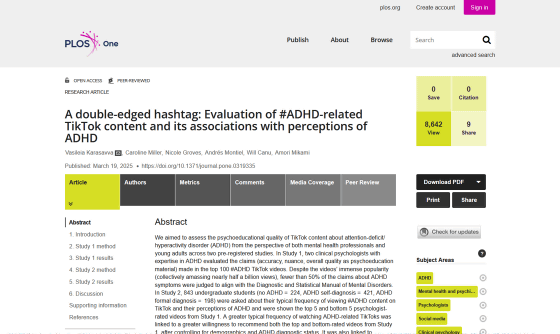Many TikTok videos about ADHD contain misinformation and distort young people's perceptions of the condition.

A double-edged hashtag: Evaluation of #ADHD-related TikTok content and its associations with perceptions of ADHD | PLOS One
https://journals.plos.org/plosone/article?id=10.1371/journal.pone.0319335

ADHD misinformation on TikTok is shaping young adults' perceptions
https://news.ubc.ca/2025/03/adhd-misinformation-on-tiktok/
TikTok Misinformation Is Warping Young People's Understanding of ADHD : ScienceAlert
https://www.sciencealert.com/tiktok-misinformation-is-warping-young-peoples-understanding-of-adhd
TikTok, a short video sharing social networking site, is extremely popular among young people, with over a billion monthly active users worldwide. Some of the videos shared on TikTok are purely for entertainment purposes, while others cover news and medical topics, and many videos about ADHD have been posted.
A research team from the University of British Columbia in Canada analyzed the top 100 most-viewed TikTok videos tagged with 'attention deficit hyperactivity disorder (ADHD).' These videos had been viewed a total of more than 500 million times.
The analysis found that less than half of the claims about ADHD symptoms made in these videos actually matched clinical guidelines for diagnosing ADHD, meaning many TikTok videos about ADHD contain some kind of misinformation.
In many videos, creators shared their personal experiences with ADHD, but did not explain that these experiences were applicable to all people with ADHD, or that they may also apply to people without ADHD. This lack of explanation increases the risk that viewers may mistakenly self-diagnose or misidentify the symptoms of ADHD, thinking, 'I've had similar experiences, so I must have ADHD.'
The study also found that the more young people watch ADHD-related TikTok videos, the more likely they are to overestimate both the prevalence and severity of ADHD in the general population and the more likely they are to recommend the videos to others. Although ADHD is one of the most common neurodevelopmental disorders diagnosed in childhood and symptoms often persist into adulthood, only 3-7% of children are diagnosed, and only about 2.5% of adults are.

The team then had two clinical psychologists watch the top 100 popular TikTok videos tagged with ADHD and score them based on accuracy and nuance, then showed the top and bottom five videos based on this scoring to 843 undergraduate students enrolled in an introductory psychology course and asked them to rate the videos.
Clinical psychologists gave the top 5 videos an average score of 3.6 (the higher the better), while undergraduate students gave the same videos an average score of 2.8. On the other hand, clinical psychologists gave the worst 5 videos an average score of 1.1, while undergraduate students gave them a significantly higher average score of 2.3. This suggests that many undergraduate students overlooked the misinformation contained in the videos and overestimated the accuracy and quality of the videos.
'TikTok can be a great tool to raise awareness and reduce stigma, but it also has its downsides,' said
The researchers say clinical psychologists and other mental health professionals can play a more active role in the discussion of ADHD on TikTok by providing authentic, expert-supported TikTok videos to counter misinformation about ADHD and mental health and give young people access to more reliable resources.
'Some young people turn to TikTok because of access barriers or negative experiences they have had with mental health professionals,' said Amoli Mikami , senior author of the study and professor of psychology at the University of British Columbia. 'It is also our responsibility to address equity disparities in who has access to clinical psychologists.'

Related Posts:
in Web Service, Science, Posted by log1h_ik







